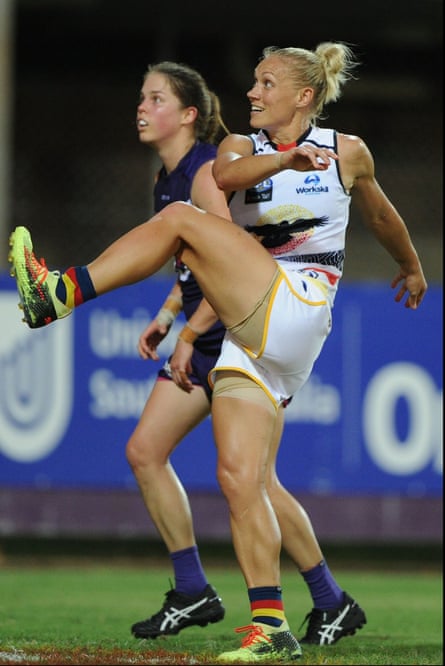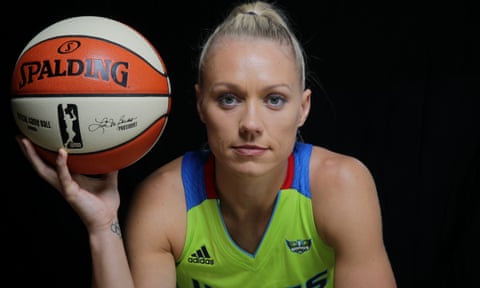It’s quite a different, somewhat unsettling experience navigating the underbelly of The Staples Center in downtown Los Angeles. Armed with nothing but a makeshift cardboard media pass, one wrong step may end in ejection from this basketball mecca.
In this unfamiliar environment, however, is a familiar face. Erin Phillips, a legend of Australian basketball and champion AFLW player, has added a new string to her bow and is the new assistant coach of WNBA franchise, the Dallas Wings.
“It’s obviously very different to playing, you see things a whole lot differently from the other side of the white line and I’m learning so much,” she says, once located in the bowels of this labyrinthine arena.
Phillips is in serene post-match mood after her Wings just lost a thriller against a strong LA Sparks team, but she is eager to continue to learn lessons. “I thought being a professional and playing basketball, you learnt all that you can and then you start coaching but it’s like, wow, I wish I knew this part of the game while I was playing.”
Sign up to receive the latest Australian sports stories every day
Seeing Phillips outside the visitors’ locker room in LA is a slightly surreal experience. Out on the court, those iconic yellow Lakers jerseys hang from the rafters and the hallowed hallways of the Staples Center are a far cry from the crowded changing rooms of suburban Australian rules football grounds.
Phillips is known primarily for her basketball prowess but the advent of the AFLW competition two years ago presented an opportunity to try her hand at something else. It was a challenge she gratefully accepted – and duly excelled at.
Phillips is at the top of her game in both codes, but one is shining a little brighter for women than the other at the moment. Additional to the facilities and impressive stadiums WNBA teams have access to are the opportunities, the league is presenting women in the coaching space.

Of the current 12 WNBA head coaches, six are female and six are male – the perfect 50/50 split of gender diversity at the top level. The league, now in its 21st year, also continues to make serious strides towards gender and racial diversity and is still a leader for diversity hiring and equality.
“There are a lot of women coaches, whether it be head coaches or assistants,” Phillips says. “There have been some very, very successful women coaches in the WNBA. Cheryl Reeve [head coach of the Minnesota Lynx] sticks out in my mind first and foremost – she’s won four WNBA championships as head coach in the past seven years.
“I don’t want to say it’s a women-dominated space [coaching in the WNBA] as we’ve got some fantastic male coaches and I think there’s a really nice spread of both men and women coaches here. Whoever is the right person for the job is who’s hired.”
For a league that has had two decades to build a platform for diversity, that sentence seems to ring true – even if it is still battling in the space of pay parity – but in Phillips’ other sporting code back in Australia, the equation is still out of balance. With Bec Goddard and Michelle Cowan both gone, not a single head coach for the third season of AFLW will be female.

“Those are the challenges we’re facing in the AFLW, trying to get women back into the game or in the game generally,” Phillips says. “We haven’t had the years of development behind us – now that AFLW is more present at grass roots and we’re seeing more women get involved there, in juniors and all the way up, women are going to have those years of experience that we didn’t have before.”
However, recent history shows that for women who do fit the bill in terms of experience and success in the AFLW, it is not translating into a movement to bring more women in. Goddard and Cowan’s posts at the helms of their clubs were seen to have smashed the glass ceiling for female coaches, but with them now lost to the league, the ceiling has once more been plastered over and it will take someone else to come along and break through again. Perhaps someone like Phillips? “Why not AFL?” she says.
By way of comparison, the WNBA’s male counterpart – the NBA – is still male dominated, but also seems to be moving towards embracing female coaches: San Antonio Spurs’ assistant coach Becky Hammon was recently promoted to the front bench. The Sacramento Kings also hired Jenny Boucek in 2017, having previously hired Nancy Lieberman. LeBron James and other NBA stars have also voiced their support for female coaches at the NBA level.
Meanwhile in the AFL, Peta Searle, the only woman appointed to a coaching role at that level, finds herself being further distanced from the St Kilda coaching box. Phillips believes moving towards full-time roles for women playing and coaching the game will begin to address these issues.
“Across the board, having a completely full-time league will be fantastic for these girls,” Phillips says. “I was in a similar situation when I first started playing basketball in the WNBL, coming from school, going to training, going to work – it’s hard. And there are demands you need to meet physically playing AFLW that are hard so I’d like to see that go to a full-time role, as well as coaching.”
It might not be fair to put the expectation on Phillips to bring her coaching nous back from the US and continue to break down the barriers in her homeland, and it might be a moot point anyway – she says she is not done with playing just yet.
“I do love football and I’d love to coach as well, but I’m going to play that game until someone drags me off the field. Until my legs fall off or somebody drags me off, I’d love to play football for as long as I can. You can always coach later.”
